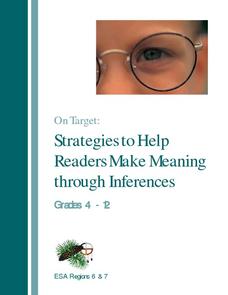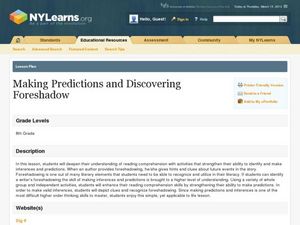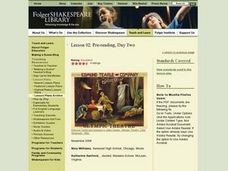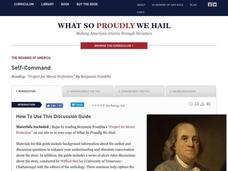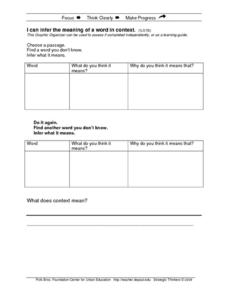Curated OER
On Target: Strategies to Help Readers Make Meaning through Inferences
Here's a resource that explicitly teaches, models, and provides readers with opportunities to practice the process of drawing inferences from text. Packed with strategies elementary, middle, and high school teachers can use, the resource...
K12 Reader
What Can You Infer?
Perhaps one of the most famous and illustrative stories featuring irony, "The Gift of the Magi" by O. Henry provides many opportunities for learners to make inferences about its characters. After reading a short introductory passage from...
Teacher Web
Inferring Character Traits
Learning how to draw inferences from text is a key reading comprehension skill. Here's a learning exercise that gives readers a chance to practice by offering 20 descriptive sentences and asking kids to identify the inferred character...
Curated OER
Foreshadowing and Making Predictions
"What happens next?" Using real-life scenarios, movies, images, and other prompts, pupils practice making predictions based on inferences from clues. A SMART board activity takes them from making predictions to writing a prediction...
Curated OER
Analyzing Atmosphere: Macbeth Murder Scene and Dagger Speech
Shakespeare's Macbeth (Act II, Scenes I and II) lacks explicit details of the murder of King Duncan, yet the author creates an atmosphere that allows us to visualize the event. Readers interpret the "Dagger Speech" by writing stage...
Curated OER
"All Summer in a Day" by Ray Bradbury
After reading "All Summer in a Day," by Ray Bradbury, have your learners respond to these questions. The worksheet starts out with comprehension questions and moves into higher-level inference and judgment questions. This could be used...
Curated OER
"Monsters Are Due on Maple Street" by Rod Serling
These questions ask learners to think about the text "Monsters Are Due on Maple Street" in a variety of ways. In addition to practicing reading comprehension, class members work on interpreting, making inferences and connections,...
Curated OER
Knights of the Round Table adapted by Gwen Ross
Everyone loves the tales involving King Arthur and his knights. After reading Knights of the Round Table by Gwen Gross, learners draw inferences and conclusions, analyze story elements, and discuss figurative language, including...
Curated OER
During Reading Strategies (Inferring)
Students practice their reading skills. In this reading fluency and comprehension lesson, students read instructor-selected passages and use metacognitive skills to make inferences based on the selections.
Curated OER
Using Pre-reading Strategies: Infer
Use this resource to support your class practicing inference with poetry and visual art. The plan calls for an examination of "The Scream" by Edvard Munch and the "Mona Lisa" to promote speculation about artist's intent. From there, it...
Curated OER
Comprehension Questions: The City of Ember, Chapter 20
Comprehension questions for the last chapter of Jeanne DuPrau's book The City of Ember assess factual recall, sequencing skills, and inference about the text. Note: One question about point of view is based on a sentence not related to...
Curated OER
Mini-Lesson: Planning for Inferences
The five lessons in this resource are designed to teach class members how to read between the lines, how to use personal experience/background knowledge/schema, along with the information in the text, to make assumptions about what is...
Curated OER
Inference Lesson Plan
Students practice assessing graphics to infer and identify an author's implicit and explicit meaning in a piece of text. They evaluate the effectiveness of information found in maps, charts, tables, graphs, diagrams, cutaways and through...
CPALMS
Analyzing Vonnegut's View of the Future and His Commentary on the Present in Harrison Bergeron
Kurt Vonnegut's short story "Harrison Bergeron" engages adolescents with its theme about the dangers of complete societal equality. Learners complete a graphic organizer to track literary elements in the story, as well as an inference...
Curated OER
Arc GIS Project: Visualizing the Holocaust
A cross-curricular lesson for middle schoolers that covers language arts, social studies, geography, and math, this is a great extension activity if your class is reading The Diary of Anne Frank or learning about the Holocaust. Using...
Curated OER
To Kill a Mockingbird: End of Novel Critical-Thinking Questions
Chapters 28 – 31 of Harper Lee’s To Kill a Mockingbird are the focus of a series of critical thinking questions. Responders are encouraged to refer directly to the novel to support their inferences and interpretations.
Houghton Mifflin Harcourt
Walt Whitman: From Song of Myself
Looking for a resource that models how to read and analyze a poem? Check out this packet that uses sections of Walt Whitman's "Song of Myself" to demonstrate how to paraphrase, note literary elements, and identify the poet's inferences.
Curated OER
Shakespeare: Julius Caesar
Before your high schoolers read Julius Caesar, have them complete this thought-provoking activity! To familiarize them with some of the play's most important lines, break the class into pairs and have them create a skit around two lines...
What So Proudly We Hail
The Meaning of America: Self-Command
Even for one of the most accomplished men in American history, there was room for improvement. Challenge high schoolers to use Benjamin Franklin's Project for Moral Perfection to analyze text, make inferences, connect to historical...
Great Books Foundation
The Glass of Milk
It's not easy to ask for help. Learn why a boy on a ship struggles with accepting help in "The Glass of Milk," a short story by Manuel Rojas. Six discussion questions prompt class members to make inferences from the text about character...
K12 Reader
Setting the Scene: Great Expectations
Expect great things from this reading comprehension exercise that asks readers to cite evidence from the provided passages of Great Expectations to support the inference that Charles Dickens' Miss Havisham, and her room, are indeed strange.
Curated OER
The Language of Our World
Students make inferences about characters in poetry. For this literature lesson, students read poetry and prose to determine how characters handle conflict in each of the genres.
Polk Bros Foundation
I Can Infer the Meaning of a Word in Context
Work on developing strategies for determining the meaning of unknown words and phrases with a quick context clues exercise. Class members choose two words from their reading and write down what they think they mean and why. See the...
Polk Bros Foundation
I Can Analyze Cause and Effect
Examine cause and effect by asking pupils to fill out a basic graphic organizer. The template is for any story or event and provides a line for writing in the story or event title. Pupils write in two causes in the circles and the change...
Other popular searches
- Making Inferences Worksheet
- Observation and Inferences
- Making Inferences in Reading
- Reading Making Inferences
- Making Inferences Grade 2
- Making Inferences Stories
- Lesson Making Inferences
- Inferences and Context Clues
- Generalizations / Inferences
- Inferences in Reading
- Reading Inferences
- Making Inferences 3rd Grade


